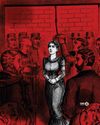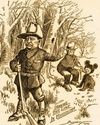BBC History UK Magazine - Christmas 2025

Holiday Sale
1767430799
Go Unlimited with Magzter GOLD
Read BBC History UK along with 10,000+ other magazines & newspapers with just one subscription
View CatalogSubscribe only to BBC History UK
Cancel Anytime.
(No Commitments) ⓘIf you are not happy with the subscription, you can email us at help@magzter.com within 7 days of subscription start date for a full refund. No questions asked - Promise! (Note: Not applicable for single issue purchases)
Digital Subscription
Instant Access ⓘSubscribe now to instantly start reading on the Magzter website, iOS, Android, and Amazon apps.
Verified Secure
payment ⓘMagzter is a verified Stripe merchant.
In this issue
Jane Austen’s Regency revelations
How her novels expose a darker side to Georgian Britain
Terror in the deep
Five fearsome sea monsters from history
Father Christmas v Santa Claus
The centuries-long battle for Britain’s chimneys
Murder most female
Could Victorian women really have committed these crimes?
2025’s BEST HISTORY BOOKS
CHOSEN BY OUR EXPERTS
BBC History UK Magazine Description:
BBC History Magazine is Britain’s bestselling history magazine devoted to history enthusiasts of all levels of knowledge and interest. Published 13 times a year, BBC History Magazine brings history to life with informative, lively and entertaining features written by the world’s leading historians and journalists. Whether it is the history of our politics and institutions, or the fascinating stories of our private lives through the ages, BBC History Magazine sheds new light on the past and helps make more sense of today’s world.Covering the latest new developments in history and archaeology from Britain and around the world, the latest, most thought provoking historical research and strong links with TV and radio programming maximizing use of BBC’s existing expertise in the genre.
Recent issues

December 2025

November 2025

October 2025

September 2025

August 2025

July 2025

June 2025

May 2025

April 2025

March 2025

February 2025

January 2025

Christmas 2024

December 2024

November 2024

October 2024

September 2024

August 2024

July 2024

June 2024

May 2024

April 2024

March 2024

February 2024

January 2024

Christmas 2023

December 2023

November 2023

October 2023
Related Titles

How It Works UK

Digital Camera UK

The Essential Guide to Portraits 2

PC Repair the complete manual

All About History UK

The Artists Guide to Illustration

The Essential Guide to Landscape Photography 3

History of War

The Ultimate Guide to Graphic Design

The Independent Guide to the Mac

Linux The Complete Manual 2nd edition

The Complete Guide to Home Video

The Complete Guide to the iPad mini

Ultimate Guide to Microsoft Office 2010

The Complete Guide to the iPad 4

The Complete Guide to the iPad 2

The Complete Guide to the iPad 3

BlackBerry PlayBook

The Complete Guide to the iPhone 5

The Independent Guide to the iPad

The Ultimate Guide to Windows 7 SP1

The Independent Guide to the iPhone 4

The Complete Guide to the iPhone 4S

Creative Steps

Amigo for children

Samsung Galaxy S4 Handbook

Ink Pellet

National Geographic Little Kids UK

National Geographic Kids UK/Ireland

UIAA Alpine Handbook draft


















































